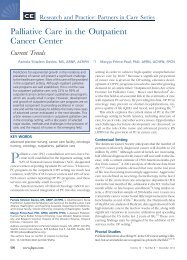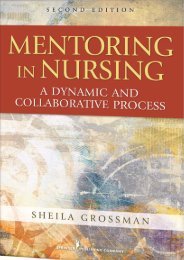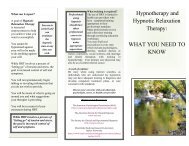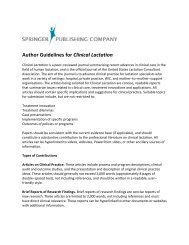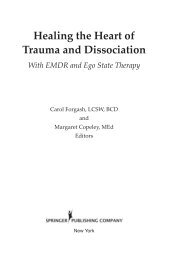Competency-Based Nursing Education - Springer Publishing
Competency-Based Nursing Education - Springer Publishing
Competency-Based Nursing Education - Springer Publishing
Create successful ePaper yourself
Turn your PDF publications into a flip-book with our unique Google optimized e-Paper software.
4 <strong>Competency</strong>-<strong>Based</strong> <strong>Nursing</strong> <strong>Education</strong><br />
The following are examples of initiatives that drew attention to<br />
CBE and provided a foundation for implementation:<br />
1. The creation of the National Skills Standard Board in the United<br />
States to develop a national system of skills standards (Voorhees,<br />
2001).<br />
2. The Dearing Report (1997) addressed the issues of lifelong learning<br />
and portability of skills in the United Kingdom.<br />
3. In Australia, competencies and skills standards are part of subuniversity<br />
programs (Faris, 1995).<br />
4. The United States has adopted competency-based approaches in<br />
K–12 education.<br />
5. Kerka (1998) observed that competency standards are related<br />
to meeting global competition and accountability. Such initiatives<br />
are seen in Britain, Australia, New Zealand, and the<br />
United States.<br />
6. Employers support and require certifications related to specific<br />
jobs.<br />
A challenge in beginning CBE efforts was to conceptualize and define<br />
what competency means and then translate it into useful and meaningful<br />
language.<br />
CONCEPTUALIZING COMPETENCE<br />
It is valuable to realize that there are different approaches to conceptualizing<br />
competence. This is important as institutions start to implement<br />
CBE curricula because the mission, philosophy, and goals of the entities<br />
need to be met. Gonczi (1994) described three ways of conceptualizing<br />
competence:<br />
1. A behaviorist or task-specific approach that is assessed by observation<br />
or performance for evidence.<br />
2. An attribute or generic-skills approach and general attributes<br />
that are crucial to effective performance, based on general competences<br />
already learned.<br />
3. An integrated or task–attribute approach.






